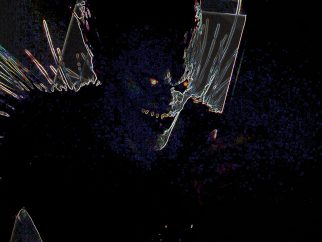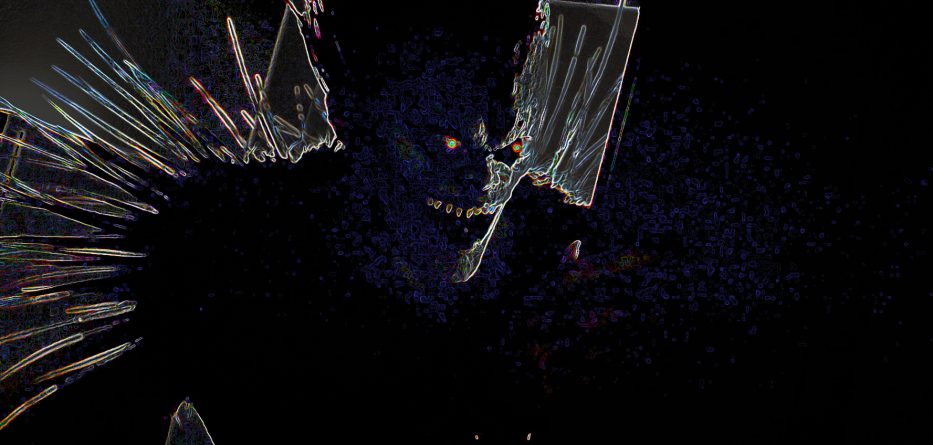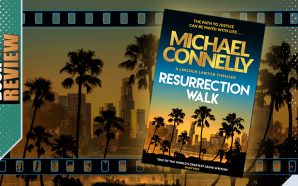Light Turner hasn’t had it easy… he’s a bright kid – so much so he ends up doing others’ homework for a fee – but never seems to be able to find his own place in the day to day world. Essentially a loner, he resents that his mother’s killer, a teflon gangster that even his police detective father can’t put away, still walks the streets. Light is surviving life rather enjoying it.
And then one day he discovers the Death Note, a journal in which you can write someone’s name within… and they die. You can stipulate the time and method and even manipulate their last hours but its rules are complex and not for the faint-hearted. It actually belongs to a death god named Ryuk who enjoys playing games with humanity and who encourages Light to get the retribution he feels his family deserves.
But the ability to rid the world of bad people is a dangerously subjective one and the Seattle authorities soon begin to notice a pattern in the increase of unexplained deaths inflicted across the city. Light’s father, unaware of his son’s involvement heads up the investigation and is joined by a legendary crime-solver known as ‘L’ who hides his face from those who might seek to hurt him.
As the stakes get higher and the morality of long-distance murder becomes less and less clear, Light finds himself trying to navigate the agendas of his girlfriend Mia, L, Ryuk and his father…
There was something of an understandable gnashing of teeth when seminal eastern horror story Death Note was announced as getting the Netflix treatment – with the story being moved to America and the central human characters generally re-assigned as Caucasian/western. For many it was just another example of ‘whitewashing’, the tendency to want to grab and option a lot of eastern material but then remove any of the specific eastern elements, citing them as limiting. Ghost in the Shell had the same problems earlier this year when it cast Scarlett Johnasson in the lead and this week Ed Skrein decided to step down from his role in the upcoming Hellboy: Rise Of The Blood Queen after it was noted that the character of Major Ben Daimio was an Asian character proud of his heritage in the original comics
On its own merits, this latest spin on the Death Note concept is perfectly decent in its execution (no pun intended), the central morality and mortality tale is simply being re-clothed to fit a broader demographic.
But the decision to shift the important cultural setting, while still leaving the eastern touchstones as mere incidentals, can’t really be ignored and is what ultimately robs the result of the extra power and logic it could have had. While the morality-tale aspect is universal, Death Note‘s characters and specific mythology are so grounded in their eastern roots, that the way this television movie simply pays lip-service to them is notable and doesn’t make a lot of sense. Narrative elements that would seem truly organic in Tokyo, Hong Kong or Korea – the idea of gods of death, demons, extreme honour and curses – are less common in Seattle. A book falling from the sky into Light’s hands at just the right/wrong moment is unexplained and it’s also unclear why the demonic Ryuk is so far from ‘home’. The character of master-detective ‘L’ is never a fit into the infrastructure of the film’s suburban USA tone, a hoodie loner with a Sherlockian reputation stylistically at odds with a contemporary police-department is a clear pointer to the source material. It’s an awkward transition: a decent story but an adaptation that won’t willingly embrace its heritage. Perhaps it’s no coincidence that one of the film’s producers is Roy Lee whose prolific career has also included steering remakes of The Ring and The Grudge in a similar domestic direction. (Masi Oka, late of on-screen roles in the likes of Heroes and Hawaii Five-O is another of the producers).
Nat Wolff, as Light Turner, gives us a grungy teenager who isn’t a fan of authority but equally isn’t actively looking to rebel… he’s just someone who’s lost his mother at an early age, tries hard to get along with his somewhat distant, work-obsessed father and tries to keep his head down, even if trouble inevitably seems to find him. In that sense, it’s a universal story. Whomever selected Willem Dafoe to performance-capture and voice the demonic Ryuk earned their wage as it’s a pitch-perfect casting, that pearly aggressive smile and wide-eyes barely hidden by the CGI-rendering of the creature at the heart of the Faustian pact. Margaret Qualley (recently seen in The Leftovers) is good with what she has to work with as the ingenue girl-friend with whom Light inevitably finds himself at odds to a dangerous degree.
Feeling more like an elongated Twilight Zone entry with a Final Destination mandate or a potential pilot with a familiar ‘with great power…‘ maxim, this Death Note is a distinct improvement over director Adam Wingard’s previous effort, Blair Witch, and on a par with another entry, The Guest. It will keep you watching for its competent ninety-minute running time as it heads towards a bigger-scale ‘climax’ than it possibly requires, but generally proves superior to a lot of the more disposable horrors out there…
Death Note is now playing on Netflix…

- Story8
- Acting8
- Originality7
- FX8
- Casting8











